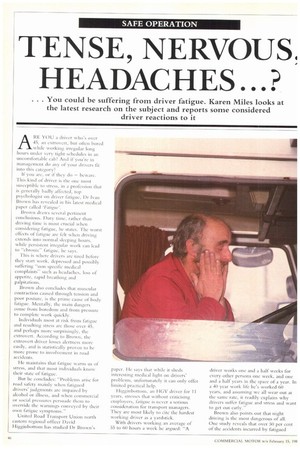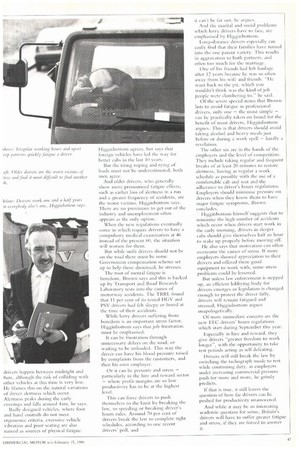TENSE, NERVOUS.
Page 46

Page 47

If you've noticed an error in this article please click here to report it so we can fix it.
HEADACHES...?
. . . You could be suffering from driver fatigue. Karen Miles looks at the latest research on the subject and reports some considered driver reactions to it
ARE YOU a driver who's over 45, an extrovert, but often bored while working irregular long hours under very tight schedules in an uncomfortable cab? And if you're in management do any of your drivers tit into this category?
If you are, or if they do — beware. This kind of driver is the one most susceptible to stress, in a profession that is generally badly affected, top psychologist on driver fatigue, Dr Ivan Brown has revealed in his latest medical paper called Tatioe'.
Brown draws several pertinent conclusions. Duty time, rather than driving time is most crucial when considering fatigue, he states. The worst effects of fatigue arc felt when driving extends into normal sleeping hours, while persistent irregular work can lead to "chronic" fatigue, he says.
This is where drivers are tired before they start work, depressed and possibly suffIn-ing "non specific medical complaints" such as headaches, loss of appetite, rapid breathing and palpitations.
Brown also concludes that muscular contraction caused through tension and poor posture, is the prime cause of body fatigue. Mentally. the main dangers conic from boredom and from pressure to complete work quickly.
Individuals most at risk from fatigue and resulting stress are those over 45, and perhaps more surprisingly. the extrovert. According to Brown, the extrovert driver losses alertness more easily, and is statistically proven to be more prone to involvement in road accidents.
He maintains that fatigue warns us of stress, and that most individuals know their state of fatigue. .
But he concludes: "Problems arise for road sat-ety mainly when fatigued drivers' judgments are impaired by alcohol or illness, and when commercial or social pressures persuade them to override the warnings conveyed by their own fatigue symptoms."
United Road Transport Union north eastern regional officer David Higginbottom has studied Dr Brown's paper. lie says that while it sheds interesting medical light on drivers' problems, unfortunately it can only offer limited practical help.
Higginbottom. an HGV driver for ll years, stresses that without criticising employers, fatigue is never a serious consideration for transport managers. They are most likely to cite the hardest working driver as a yardstick.
With drivers working an average of 55 to 60 hours a week he argued: "A
driver works one and a half weeks for every, other persons one week, and one and a half years in the space of a year. In a 40 year work life he's worked 60 years, and assuming we all wear out at the same rate, it readily explains why drivers suffer fatigue and stress and want to get out early."
Brown also points out that night driving is the most dangerous of all. One study reveals that over 50 per cent of the accidents incurred by fatigued
drivers happen between midnight and Barn, although the risk of-colliding with other vehicles at this time is very low. He blames this on the natural variations of driver alertness which occur. Alertness peaks during the early evenings and falls around 4am, he says.
Badly designed vehicles, where foot and hand controls do not meet ergonomic criteria, excessive vehicle vibration and poor seating are also named as sources of physical fatigue. Higginborrom agrees, but says that foreign vehicles have led the way for better cabs in the last 10 years.
But the tiring roping and tying of loads must not be underestimated, both men agree.
And older drivers, who generally show more pronounced fatigue effects, such as earlier loss of alertness in a run and a greater frequency of accidents, are the worst victims, Higg,inbottom says. There are no provisions to get out of the industry and unemployment often appears as the only option.
When the new regulations eventually come in which require drivers to have a compulsory medical examination at 46 instead of the present 60. the situation will worsen for them.
But while unfit drivers should not be on the road there must he some Government compensation scheme set up to help those dismissed, he stresses.
The root of mental fatigue is boredom, Brown says and this is backed up by Transport and Road Research Laboratory tests into the causes of motorway accidents. The TRI11, found that 11 per cent of its tested HGV and PSV drivers had felt sleepy or bored at the time of their accidents.
While lorry drivers suffering from boredom is an important stress Eictor, Higginbottom says that job frustration must be emphasised.
It can be frustration through unnecessary delays on the road, or waiting to be unloaded. This way the driver can have his blood pressure raised by complaints from die customers, and then his own employer.
Or it can be pressure and stress — particularly in the hire and reward sector — where profit margins are so low productivity has to be at the highest
This can force drivers to push themselves to the limit by breaking the law, so speeding or breaking driver's hours rules. Around 70 per cent of drivers break the law to complete tight schedules, according to one recent drivers' poll, and
it can't be far out, he argues.
And the marital and social problems which lorry drivers have to face, are emphasised by Higginhottom.
Long-distance drivers especially can easily find that their families have turned into the one parent variety. This results in aggravation to both partners, and often too much for the marriage.
One of his friends had left haulage after 12 years because he was so often away from his wife and friends. "lie want back to the pit, which you wouldn't think was the kind ofjoh people were clambering to,'" he said.
Of the seven special items that Brown lists to avoid fatigue in professional drivers, only one — the most simple — can be practically taken on board for the benefit of most drivers, I ligginbottom argues. This is that drivers should avoid taking alcohol and heavy meals just before or during a work spell — hardly a revelation.
The, other six are in the hands of the employers and the level of competition. They include taking regular and frequent breaks of at least 20 minutes to restore alertness, having as regular a work schedule as possible with the use of a comfortable cab and seat and the adherance to driver's hours regulations. Employers should minimise pressure on drivers when they know them to have major fatigue symptoms, Brown concludes.
Higgin bottom himself suggests that to minimise the high number of accidents which occur when drivers start work in the early morning, drivers in sleeper cabs should give themselves half an hour to wake up properly before moving off.
He also says that motivation can often overcome the causes of stress. If inure employers showed appreciation to their drivers and offered diem good equipment to work with, some stress problems could be lessened.
But unless law enforcement is stepped up, an efficient lobbying body for drivers emerges or legislation is changed enough to protect the driver fully, drivers will remain fatigued and stressed, Higginbortom argues unapologetically.
Of more immediate concern are the new EEC drivers' hours regulations which start during September this year.
Especially iii lure and reward, they give drivers "greater freedom to work longer'', with the opportunity to take rest periods acting as self defeating.
Drivers will still break the law by switching the tachograph mode to rest while continuing duty, as employers under increasing commercial pressure push for more and more, he grimly predicts.
If that is true, it still leaves the question of how far drivers can be pushed fbr productivity unanswered.
And while it may be an interesting academic question for some, Britain's drivers will have to suffer greater fatigue and stress, if they are forced to answer it.






















































